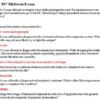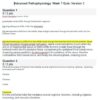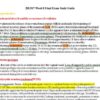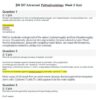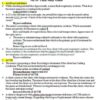Description
NR 507 Week 7 Quiz with Answers
- A bone breaks in a place where there was pre-existing disease. What type of fracture is being described?
- Patients with osteoporosis are at risk for which of the following problems?
- The best screening test for osteoporosis is:
- Pain and inflammation associated with gout are caused by crystallization of _____ in the tissues.
- The chief pathologic feature of degenerative joint disease is:
- Reflux esophagitis is defined as:
- Gastric ulcers are characterized by:
- The most common cause of elevated liver function tests is:
- An individual is to begin a series of hepatitis B vaccines. You perform a test for a serogical marker, and the results show hepatitis B surface antibodies (HBsAb). You tell the individual that:
- Which of the following nutritional disorders is characterized by consumption of large amounts of food (binging) followed by self-induced vomiting and/or the use of laxatives (purging)?
- The pathophysiology of Type 1 Diabetes involves which of the following:
- The symptom of polyuria in Diabetes Mellitus is caused by:
- When evaluating the kidney function of a client with Diabetes Insipidus (DI) the nurse would observe:
- Chronic complications of Diabetes Mellitus (DM) include which of the following?
- Signs common to both type 1 and type 2 diabetes mellitus (DM) include all of the following EXCEPT:
- A 56 y.o. male was admitted to the hospital with a diagnosis of osteomalacia. History reveals that he underwent bariatric surgery 3 years earlier. What is the common link between the surgery and the development of osteomalacia?
- A 70 y.o. female presents with a hip fracture secondary to osteoporosis. This condition is caused by an increase in bone:
- The diagnosis of rhabdomyolysis is based on the measurement of which laboratory value?
- A 36 y.o. old reports pain and weakness in the elbow. MRI reveals inflammation of the tendon and the presence of microtears where it attaches to bone. This condition is called:
- Transchondral fractures are most prevalent in:







